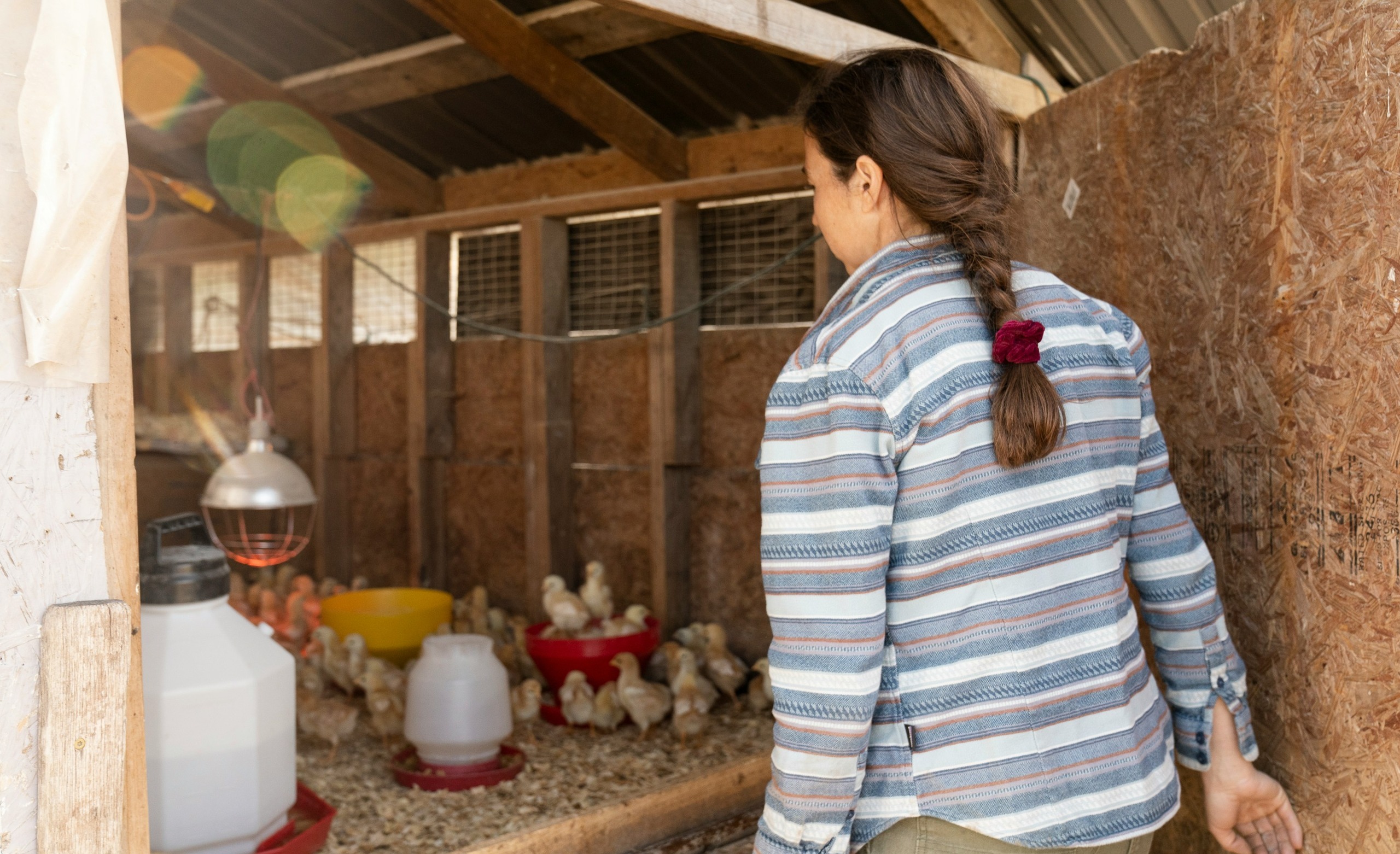
How To Raise Chickens For Beginners
Welcome to the ultimate guide on how to raise chickens for beginners. Are you tired of store-bought eggs that lack flavor? Or maybe you’re looking for a fun and rewarding hobby? Raising chickens could be the perfect solution! Whether you have a spacious backyard or just a small urban plot, these charming birds can bring joy and sustainability to your life.
Imagine stepping outside each morning to collect fresh eggs laid by your very own flock. It’s more than just nourishing food; it’s an experience that connects you with nature. But where do you start? If you’re new to the world of poultry, don’t worry! This guide will walk you through everything you need to know about how to raise chickens for beginners.
From selecting the right breed to setting up their cozy coop, we’ve got all the tips and tricks you’ll need for a successful chicken-keeping adventure. Get ready to cluck along on this exciting journey!
Why Raising Chickens is Becoming Popular
More people are turning to backyard chicken farming. This trend is fueled by a growing interest in sustainable living and self-sufficiency. Having chickens allows families to produce their own fresh eggs. No more mystery eggs from the grocery store! You know exactly where your food comes from.
Additionally, raising chickens can be a fun hobby. Many find joy in caring for these quirky creatures. They have unique personalities that make them delightful companions. Urban gardening has also played a role in this popularity surge. As city dwellers seek ways to connect with nature, chickens offer an ideal solution for small spaces.
Educational opportunities abound when it comes to raising chickens. Kids can learn responsibility while gaining insights into animal care and food production. The experience fosters a deeper appreciation for agriculture and sustainability.
Benefits of Raising Chickens
Raising chickens offers numerous perks that go beyond simply collecting eggs. Fresh, organic eggs are a delight, bursting with flavor compared to store-bought varieties. Knowing your birds have been well cared for adds peace of mind. Chickens can serve as great pest control agents in your backyard.
They love to forage and will happily munch on insects, larvae, and weeds. This not only keeps your yard cleaner but also reduces the need for harmful pesticides. Additionally, chicken keeping fosters a unique bond between you and your flock. Caring for them daily creates routine and companionship that many find fulfilling.
They’re excellent at converting kitchen scraps into nutritious food sources too! Instead of tossing leftovers into the bin, feed them to your hens. It’s an eco-friendly way to reduce waste while providing quality nutrition to your birds.
What You Need to Get Started
Getting started with raising chickens requires some essential supplies. First on the list is a sturdy coop. Your chickens need shelter from weather and predators. Next, consider a secure run space. This allows them to roam safely while preventing escape or unwanted visitors.
Don’t forget food and water containers. Choose ones that are easy to clean and refill regularly. You’ll also want bedding material like straw or wood shavings for comfort and cleanliness in the coop. A first aid kit should be part of your setup too.
Chickens can get sick, so having basic supplies on hand is wise. Have a reliable source of information, whether it’s books or online resources. Knowledge will help you navigate challenges as they arise; being prepared makes all the difference!
Choosing the Right Breed for You and Your Space
Choosing the right chicken breed is crucial for your success. Different breeds come with unique characteristics and temperaments. Consider your space. If you have a small backyard, bantam or smaller breeds might be ideal. They take up less room and can still provide eggs. On larger properties, think about heavier layers like Rhode Island Reds or Leghorns.
Think about climate too. Some chickens thrive in cold weather while others prefer warmth. For example, Orpingtons are great for chilly climates, whereas most Mediterranean breeds enjoy sunny conditions. Consider your goals—are you raising chickens for eggs, meat, or companionship? Breeds like Sussex offer both good egg production and tasty meat.
Researching various breeds will help ensure that you find the perfect fit for your lifestyle and environment. Your flock should be a joy to care for!
Preparing for Your Flock: Housing and Supplies
When preparing for your flock, proper housing is essential. Chickens need a safe and secure coop to protect them from predators and harsh weather conditions. Ensure the coop has adequate ventilation, sunlight, and space for each bird.
Consider how many chickens you plan to raise. A general rule is at least 4 square feet per chicken inside the coop and 10 square feet in an outdoor run. You’ll also require specific supplies like nesting boxes for egg-laying, feeders, and water dispensers. Keeping food fresh is crucial; opt for durable containers that keep out pests.
Don’t forget bedding materials like straw or pine shavings to absorb waste and provide comfort. Regular maintenance of their environment helps prevent diseases. By investing time in setting up a suitable habitat now, you’ll ensure your chickens thrive as they settle into their new home.
Setting Up a Coop and Run
Creating a safe and comfortable environment for your chickens is essential. A well-designed coop protects them from predators and harsh weather. Start by choosing an ideal location. It should be dry, sunny, and away from strong winds. Ensure that the site has good drainage to keep it free of standing water.
The coop itself needs adequate space—about 4 square feet per chicken inside is ideal. Incorporate proper ventilation to maintain fresh air without drafts. Nesting boxes are necessary for egg-laying; one box can serve two or three hens.
Now, let’s talk about the run. This outdoor area allows chickens to roam freely while staying protected. Enclose it with sturdy fencing at least six feet high to prevent escape and deter predators. Consider adding features like dust baths, perches, and plenty of shade within the run for enrichment. Happy birds lead to happier eggs!
Feeding and Caring for Your Chickens
Feeding your chickens is crucial for their health and productivity. Start with a balanced diet that includes commercial chicken feed, which is specially formulated to meet their nutritional needs. Look for options containing grains, proteins, vitamins, and minerals.
In addition to feed, providing fresh water daily is essential. Chickens can drink a surprising amount of water, especially in warmer weather. Ensure their containers are clean and filled regularly. Supplementing with kitchen scraps can be beneficial too. Vegetables like greens or leftover grains make great treats but avoid toxic foods such as onions and chocolate.
Observe your flock’s behavior during feeding times; this helps you understand if they’re getting enough nutrients or if adjustments are needed. Always keep an eye out for any signs of illness or distress among your birds so you can address issues promptly and maintain a healthy environment for them to thrive.
Common Challenges and How to Overcome Them
Raising chickens can be rewarding, but it comes with its own set of challenges. One common issue is dealing with pests. Rodents and insects can invade your coop, causing stress for both you and your flock. Regular cleaning and proper food storage are essential to mitigate this problem.
Another challenge is health concerns among the birds. Chickens can suffer from various diseases, so keeping an eye on their behavior is crucial. If a chicken seems lethargic or off-breed, consult a vet familiar with poultry care. Weather conditions also pose hurdles; extreme heat or cold can affect your chickens’ well-being.
Provide adequate ventilation in hot weather and ensure they have cozy nesting areas during colder months. Integrating new members into an existing flock may lead to pecking order issues. Gradually introducing newcomers helps ease the transition while maintaining harmony within the group.
Tips for a Successful Chicken Farming Experience
Start by establishing a routine. Chickens thrive on consistency, so feeding and checking them at the same time daily creates stability. Monitor their health closely. Look for signs of illness or distress regularly. Early detection can save you from larger issues later.
Encourage social interaction among your flock. Chickens are social creatures, and they flourish in groups. Consider adding chickens over time to maintain harmony. Invest in quality feed tailored to your chickens’ age and purpose, whether it’s eggs or meat production. Nutritional needs vary greatly.
Maintain cleanliness in the coop to prevent pests and disease outbreaks. Regularly clean bedding and provide fresh water each day. Enjoy the process! Engage with your flock as they grow and learn their unique personalities; it adds joy to this rewarding endeavor.
Final Thoughts: Raising Your Own Chickens
Raising your own chickens can be a rewarding adventure. It’s not just about the fresh eggs and the joy of watching them roam around. It offers an opportunity to connect with nature, learn new skills, and enjoy a sense of accomplishment.
Throughout this journey, you’ll discover that chickens have unique personalities and quirks. They each bring something special to your backyard farm. Whether it’s their clucking conversations or their amusing antics, they add life to your space.
With proper care, attention, and knowledge at hand, you’ll create a thriving environment for your flock. Embrace the challenges along the way; every bump in the road teaches valuable lessons. As you continue on this path, remember that it’s all part of nurturing both your chickens and yourself.
So why wait? Dive into this wonderful world of chicken-keeping! The experience awaits you—full of laughter, learning moments, and delightful surprises right outside your doorstep.




There is nothing better than the taste of fresh home-produced eggs, and knowing that there are no nasty chemicals lurking in them. We for years kept chickens and the biggest challenge used to be to keep them safe from the fox. Our kids loved to fetch the fresh eggs, and they were always excited about how many we might get in the day.
My son now keeps chickens and my grandchildren love it. Apart from collecting the eggs, it also teaches the kids animal husbandry and having to feed them and make sure they have fresh water. All the compost goes to the chicks, and they love it, while also reducing the waste.
I will always recommend to anyone that has the space, to keep their own chickens.
Hello LineCowley,
Thank you for stopping by and sharing your experience about raising chickens with us. I was hoping that someone would stop by that is already raising chickens so our readers can see what a rewarding endeavor it can be. My wife and I have several chickens. My favorite is a chicken named Fred.
I raised him from a chick but he thinks he’s a dog. When I come home, he waits at the end of the drive way for and chases the car until I stop. As soon as I open my door, he jumps in for me to hug and pet him. He follows me all around the property. Like I said, he thinks he’s a dog.
Best wishes,